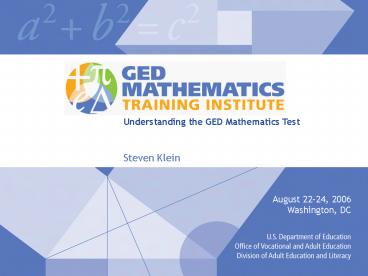Understanding the GED Mathematics Test - PowerPoint PPT Presentation
1 / 12
Title:
Understanding the GED Mathematics Test
Description:
Consists of Five Subject Area Tests. Math, Reading, Science, Social Studies, Writing. Math Exam has Two Equally Weighted Parts. Part 1: Use of Casio fx-260 calculator ... – PowerPoint PPT presentation
Number of Views:897
Avg rating:3.0/5.0
Title: Understanding the GED Mathematics Test
1
Steven Klein
August 2224, 2006 Washington, DC
2
Overview
- GED Test Structure
- GED Candidate Performance
- Review of GED Testing Service (GEDTS) Study of
Math Exam
3
GED Test Structure
- Consists of Five Subject Area Tests
- Math, Reading, Science, Social Studies, Writing
- Math Exam has Two Equally Weighted Parts
- Part 1 Use of Casio fx-260 calculator
- Part 2 Calculations by hand
- Math Test Format
- 25 questions and 45 minutes per section
- Scored on range of 200 to 800
- 80 percent of questions multiple choice
- 20 percent of questions alternative format
(e.g., graphing)
4
GED Test Structure (Continued)
- Math Content Areas
- Number Sense and Operations
- Measurement and Geometry
- Data Statistics and Probability
- Algebra, Functions, and Patterns
- Three Question Types
- Procedural
- Conceptual
- Application
5
GED Candidate Performance
- U.S. Candidate Profile 2004
- Average Age 24.7 years
- Gender 55.1 male 44.9 female
- Ethnicity
- 55.3 White
- 18.1 Hispanic Origin
- 21.5 African American
- 2.7 American Indian or Alaska Native
- 1.7 Asian
- 0.6 Pacific Islander/Hawaiian
- Average Grade Completed 10.0
6
GED Candidate Performance(Continued)
Passage requires an average score of at least
450 across all five tests with no score below 410.
7
GEDTS Study Review Methodology
- Analysis of 2003 Math Test Results
- Review of three test forms
- Used top 40 of most frequently missed items
- Identified themes among missed items
- Compared GED Candidates Failing to Achieve Math
Passing Score in 2003 - Candidates scoring near the cut score
- Candidates scoring within 1?2 SEMs (Standard
Error of Measure) below the cut score
8
GEDTS Study Review Findings
- Both Candidate Groups
- Had equal difficulty on Parts I and II
- Miss similar types of questions
- Make similar types of errors
- Common Themes Identified
- Geometry and Measurement
- Applying Basic Math Principles to Calculation
- Reading and Interpreting Graphs and Tables
9
GEDTS Study ReviewIdentified Skill Gaps
- Geometry and Measurement
- Selecting the correct procedure to solve a
problem - Constructing mathematical formulas to represent
geometric figures - Modifying knowledge to solve complex problems
10
GEDTS Study ReviewIdentified Skill Gaps
- Applying Basic Math Principles to Calculation
- Performing arithmetic computations
- Estimating results
- Falling victim to distracters
11
GEDTS Study ReviewIdentified Skill Gaps
- Reading and Interpreting Graphs and Tables
- Extracting information presented in tabular or
graphic form - Comparing graphical figures representing
different conditions
12
GEDTS Study ReviewRecommendations
- Adjust curriculum to emphasize identified
thematic areas - Present alternative ways to approach a problem to
tap more of the abilities that candidates possess - Review thematic areas prior to test

